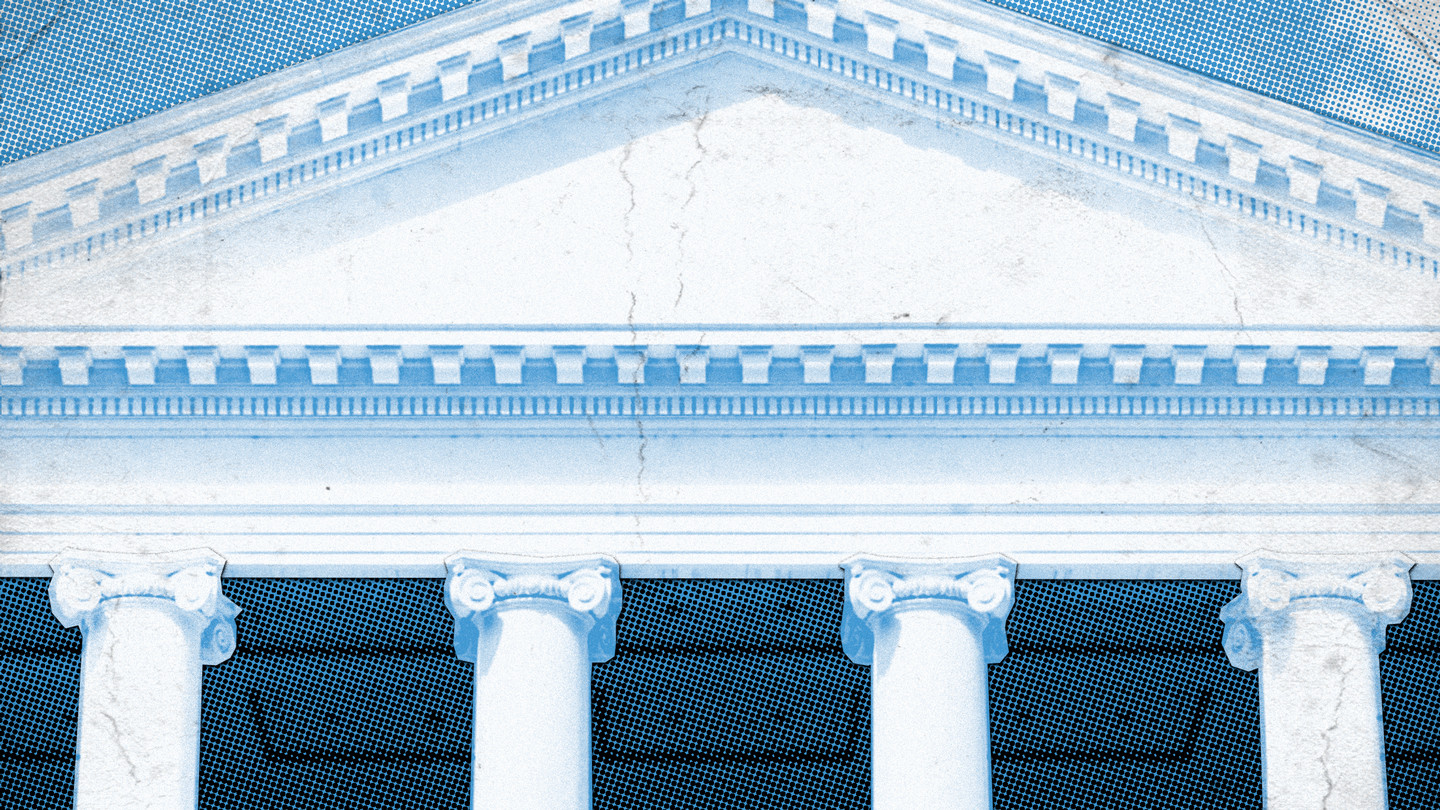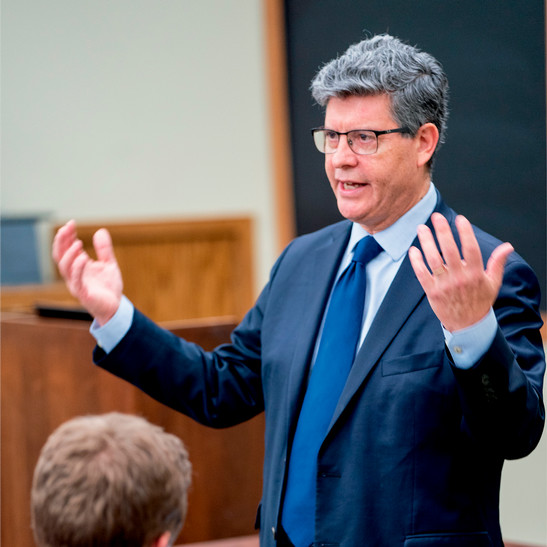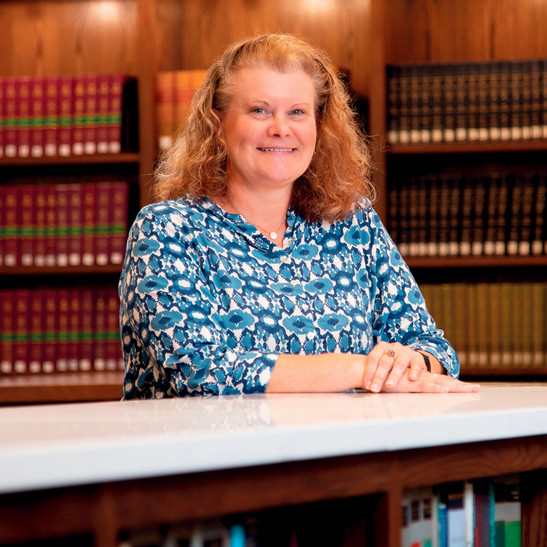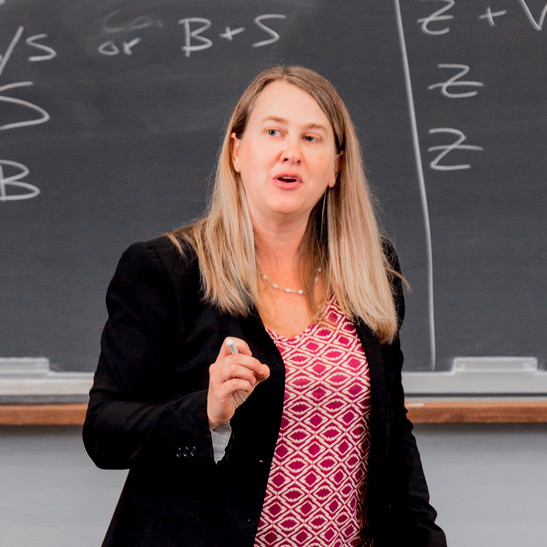Historical lens, modern analysis
When questions about Donald Trump’s eligibility for the presidency under the 14th Amendment emerged as a major constitutional issue in 2023, professor Kurt Lash found himself reluctantly thrust into the national spotlight. As the E. Claiborne Robins Distinguished Professor of Law, Lash had spent decades studying the history and original meaning of the 14th Amendment but had never closely examined Section 3, the provision at the center of the controversy.
“I deeply desired to stay out of it because it was so politically divisive,” says Lash. “But my role here at the law school obligates me to play a part when asked and use the resources the school has given me to research knowledge about the Constitution.”
That sense of duty led Lash to moderate a panel on Section 3 at UCLA in September 2023. To prepare, he dove into his extensive collection of historical documents about the 14th Amendment’s framing and ratification. What he found surprised him: There was no clear historical evidence that the amendment’s authors intended Section 3 to apply to the presidency.
The provision explicitly names senators, representatives, and presidential electors as offices subject to disqualification but notably omits any mention of the president. According to Lash, this wasn’t an oversight. The amendment’s authors were primarily concerned about preventing former Confederates from regaining power at the state level, where they could influence the selection of federal officials. They weren’t worried about the presidency because they didn’t believe the American public would elect someone disloyal to the Union.
“It’s been a privilege to have been cited by the Supreme Court in the past, but for those of us who write amicus briefs, we recognize that we may never be cited at all.”
Lash’s historical analysis gained traction after he published an op-ed in The New York Times and a journal article expanding on his findings. Though he declined to participate directly in litigation, he submitted an amicus brief to the Supreme Court summarizing his research. In February 2024, the Court’s ruling aligned with Lash’s interpretation, finding that states could not unilaterally disqualify presidential candidates under Section 3.
For Lash, the experience illustrated the vital role academic scholarship can play in contemporary legal debates. “It’s been a privilege to have been cited by the Supreme Court in the past,” he says. “But for those of us who write amicus briefs, we recognize that we may never be cited at all. We’re hoping to bring helpful information to the court and make it more likely that they’ll come up with a reasonable opinion consistent with the text of the Constitution.”
The purpose of rigorous historical research, Lash says, is to build a foundation of knowledge that can inform public policy debates and constitutional interpretation for generations to come. “That academic work, if it’s done well, becomes a resource available to later generations of
scholars, lawyers, and citizens.”
Patent reform on Capitol Hill
Kristen Jakobsen Osenga — law professor and associate dean for academic affairs — testified before the Senate Judiciary Subcommittee on Intellectual Property in December. There, she delivered a message that was both simple and powerful: The proposed RESTORE Act is “perfect.”
Osenga brought her expertise in patent law to Capitol Hill to advocate for legislation that would strengthen patent holders’ rights against infringement. The bill would restore patent owners’ ability to obtain injunctions against those who infringe on their intellectual property — a right that was significantly curtailed by a 2006 Supreme Court decision.
“For the last 20 years, it has become harder and harder for patent owners to get an injunction, even when somebody is trespassing on their idea,” Osenga said. She likens patent infringers to squatters whom property owners cannot remove, despite the fact that they are occupying property without permission.
This venture into congressional testimony marks a new chapter in Osenga’s career. Though she has long been a voice for strong patent protections through academic writing and op-eds, direct advocacy wasn’t initially part of her plan. That changed in 2024 when she took on the role of chief policy counsel for a 501(c)(4) advocacy group, discovering a passion for public engagement on patent policy issues.
“I never thought I wanted to be an actual advocate,” Osenga said. “But now, I’m like, advocating is my jam.”
Her enthusiasm for patent law stems from a deep conviction about innovation’s role in society. From everyday conveniences like navigation apps to crucial medical advances, Osenga sees patent protection as vital to fostering the innovation that drives economic growth and improves lives.
“I never thought I wanted to be an actual advocate, but now, I’m like, advocating is my jam.”
“Innovation is everywhere, touches every aspect of our life,” she said. “How do we get innovation? We encourage people to innovate, and one way we do that is by granting patents.”
The December hearing, which included testimony from inventors and industry representatives, laid the groundwork for the bill’s potential reintroduction in the new congressional session. Osenga remains optimistic about its prospects, noting that patent law typically transcends partisan divisions.
“Intellectual property is bipartisan and less ideological,” she said. “Whether you like patents or hate patents, it transcends ideology.”
For Osenga, who began her career as an engineer before finding her way to patent law and academia, this expanded role in advocacy represents an opportunity to make direct impact beyond the classroom and academic publications. It’s work she plans to continue, supported by Richmond Law’s culture of valuing real-world engagement alongside traditional scholarship.
“Instead of just writing and shouting into the ether where only other law professors read it,” she said, “I’m actually talking to Congress—like, with my mouth. That’s a huge impact.”
Attorney compensation: What’s fair?
In 2018, Tesla’s board approved a $55 billion compensation package for co-founder and CEO Elon Musk, but few thought he would meet the ambitious growth targets required to earn it. Yet he did, turning Tesla into a trillion-dollar company. However, questions remained about the approval process, leading to a shareholder lawsuit that would eventually invalidate the package — and spark a broader debate about attorney compensation in corporate litigation.
Enter Jessica Erickson, the Nancy Litchfield Hicks Professor of Law. For over a decade, Erickson and her co-authors have been studying the complex dynamics of shareholder litigation and attorney compensation. Their work recently gained prominence when it was cited by the U.S. Chamber of Commerce in an amicus brief filed in the 2024 Tesla case, where the plaintiffs’ attorneys requested billions in fees after successfully challenging Musk’s pay package. The Chamber’s inclusion of Erickson’s research highlights its growing influence in the ongoing debate over attorney compensation in corporate litigation.
“These cases are a crucial step in holding corporate boards accountable,” said Erickson, who has taught corporate law at Richmond since 2007. “But there’s a delicate balance. We need to ensure attorneys are paid enough to incentivize them to bring good cases, but no more than that.”
This balance is particularly important because the money comes from shareholders, often through retirement funds and institutional investors. “Whether you know it or not, if you have retirement savings, you’re likely invested in these companies,” Erickson notes. “When companies pay out excessive legal fees, it affects everyone’s bottom line.”
“There’s a delicate balance. We need to ensure attorneys are paid enough to incentivize them to bring good cases, but no more than that.”
Erickson’s latest research will analyze whether the Delaware Court of Chancery, America’s premier business court, typically awards higher attorney fees than federal courts in similar cases. While Delaware judges maintain their cases are different, Erickson and her team are now gathering data to test this claim empirically. With the business community taking notice — as evidenced by the Chamber of Commerce’s citation of her work — Erickson’s research could help shape how courts approach attorney fee awards in future cases.
In the Tesla case, while attorneys requested billions in fees, the court awarded approximately $300 million — still a substantial sum that raises questions about appropriate compensation in major corporate litigation. Meanwhile, Tesla has voted to leave Delaware for Texas, highlighting the broader implications of these decisions for corporate governance.
For Erickson, the work is about litigation design and using data to drive better outcomes for shareholders. “It’s easy to say what we think should happen,” she said, “but harder to determine what’s actually happening and predict the impact of rule changes on the ground.”
As these issues continue to play out in courtrooms across the country, Erickson’s empirical approach offers a valuable framework for evaluating attorney compensation in corporate litigation — one that could help shape the future of shareholder rights and corporate accountability.
Challenger to data-driven sentencing
Professor Erin Collins wrote a provocative law review article titled “Abolishing the Evidence-Based Paradigm,” challenging mainstream reform efforts’ reliance on quantitative data. Her arguments rapidly drew interest, and she was soon after invited to testify before the U.S. Sentencing Commission to address proposed amendments to federal sentencing guidelines for youthful offenders.
A specific provision in the proposed guidelines would have required judges to consider research showing higher re-arrest rates among younger individuals when deciding sentences. “They’re using re-arrest rates as a stand-in for future behavior,” Collins said. “But arrest rates don’t tell us much about what a particular individual is going to do.”
Collins, who teaches evidence law and criminal procedure, testified to highlight several critical problems with using arrest data to inform sentencing decisions. She pointed out that an arrest doesn’t necessarily indicate criminal behavior; it only shows that the police suspected someone of a crime and chose to take action. Policing, she went on to explain, isn’t deployed equally across all communities, which leads to racial disparities in arrest rates.
Collins also argued that using group-based statistics to make predictions about individuals is fundamentally flawed. “Data doesn’t just exist in the world,” she said. “People create data. It’s gathered, analyzed, and put to work by humans.” This understanding drives her call for “data skepticism,” a more critical approach to how we define and measure concepts like public safety and successful reform.
“We need to break with the notion that crime rates are synonymous with public safety. That’s a very limited and limiting view of safety.”
The U.S. Sentencing Commission ultimately decided not to adopt the provision Collins critiqued, marking a significant victory for her perspective. But her broader goal is to encourage policymakers to think beyond traditional metrics like recidivism rates when evaluating criminal justice reforms.
“We need to break with the notion that crime rates are synonymous with public safety,” Collins said. “That’s a very limited and limiting view of safety.” Collins advocates for a more comprehensive vision that considers the experiences of directly impacted communities and recognizes that safety can mean different things to different groups — from having meaningful educational and employment opportunities to not fearing law enforcement interactions.
Collins sees encouraging signs in the commission’s current direction under chair Judge Carlton Reeves, who has been expanding the voices heard in policy discussions by inviting formerly incarcerated people to speak at commission hearings. “It’s wonderful to see folks who are open to new ideas and willing to run the Sentencing Commission differently,” Collins said.
For Collins, a former public defender, the experience demonstrated the real-world impact academic scholarship can have. “It’s easy to think my scholarship won’t have an impact beyond a small circle of law professors,” she said. “Seeing it reach people with the power to set law and policy for people whose real lives are at stake — it was truly an honor.”
Climate justice
A team of advocates including professor Chiara Giorgetti stood before the International Court of Justice in December. There, they represented more than just the African Union — they spoke for climate justice on behalf of a continent bearing the brunt of climate change while contributing minimal emissions to the crisis.
Giorgetti, who has taught international law at Richmond Law for 12 years, was part of a legal team presenting evidence in a landmark advisory opinion case on climate change before the ICJ, the United Nations’ principal judicial body. The case has drawn unprecedented participation, with 94 countries and organizations providing input.
“Africa’s experience is very unjust,” Giorgetti said. “The African continent produces only 4% of global greenhouse gas emissions, yet they are suffering the most severe consequences of climate change.” These impacts include rising sea levels threatening coastal communities, widespread desertification damaging agricultural production, and extreme weather events that displace populations.
The team’s arguments centered on three key points: that the full body of international law applies to climate change issues (not just climate-specific agreements); that there is clear causality between greenhouse gas emissions and impacts in Africa; and that emitter nations should provide compensation for damages.
Their evidence included expert scientific testimony documenting historical emission patterns and changing weather data. “We can now provide very detailed data showing exactly how much each country has emitted historically,” Giorgetti said.
“We [faculty] are very fortunate to work where we are. We get to do things we couldn’t do otherwise.”
The African Union’s requested remedies include stricter emission limits, technology transfer to support cleaner development, and debt reduction for affected nations. As Giorgetti points out, many African countries face higher borrowing costs due to climate-related risks, creating a “vicious circle” that compounds the challenge.
The ICJ is expected to issue its advisory opinion in mid-2025. While the court cannot directly enforce compensation or specific actions, its opinion will help define applicable international law and countries’ obligations regarding climate change — potentially including responsibilities to communities and individuals, not just other nations.
For Giorgetti, who has dedicated her career to international law and dispute resolution, representing the African Union was particularly meaningful. “I was very lucky when they asked me,” she says. “You can’t have a more interesting client on these issues.”
The opportunity to contribute to such consequential international proceedings while teaching is something Giorgetti deeply values: “We [faculty] are very fortunate to work where we are. We get to do things we couldn’t do otherwise.”
The climate change advisory opinion case could prove to be one of the ICJ’s most significant rulings, helping shape how the international community addresses what Giorgetti calls “historical injustice” in the climate crisis. And for African nations seeking climate justice, the stakes and expectations are high. ■
Photography by Jamie Betts and Gordon Schmidt





